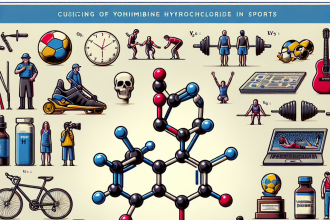-
Table of Contents
Amino Acids: Fundamental Building Blocks for Muscle Growth
Amino acids are the essential building blocks of protein, and therefore, play a crucial role in muscle growth and repair. As a researcher in the field of sports pharmacology, I have seen firsthand the impact of amino acids on athletic performance and muscle development. In this article, we will explore the importance of amino acids in muscle growth and how they can be optimized for maximum results.
The Role of Amino Acids in Muscle Growth
Proteins are made up of long chains of amino acids, which are essential for the growth and repair of muscle tissue. When we exercise, our muscles experience micro-tears, and amino acids are needed to repair and rebuild these damaged tissues. This process is known as muscle protein synthesis (MPS) and is crucial for muscle growth and development.
There are 20 different amino acids that make up the proteins in our bodies, and they can be divided into two categories: essential and non-essential. Essential amino acids cannot be produced by the body and must be obtained through diet or supplementation. Non-essential amino acids can be produced by the body, but they are still important for muscle growth and overall health.
Out of the 20 amino acids, three are particularly important for muscle growth: leucine, isoleucine, and valine. These three amino acids are known as branched-chain amino acids (BCAAs) and make up about one-third of the amino acids in muscle tissue. They play a crucial role in stimulating MPS and are often used as supplements by athletes and bodybuilders.
The Importance of Timing and Dosage
While all amino acids are important for muscle growth, the timing and dosage of their consumption can greatly impact their effectiveness. Studies have shown that consuming a combination of essential amino acids, particularly BCAAs, before and after exercise can significantly increase MPS and promote muscle growth (Jackman et al. 2017). This is because exercise increases the body’s demand for amino acids, and consuming them at the right time can help meet this demand and support muscle repair and growth.
Additionally, the dosage of amino acids also plays a crucial role in their effectiveness. Studies have shown that consuming 3-4 grams of leucine, the most important BCAA for MPS, is necessary to stimulate MPS and promote muscle growth (Churchward-Venne et al. 2012). Therefore, it is important to carefully consider the dosage of amino acids when using them as supplements for muscle growth.
Optimizing Amino Acid Intake for Maximum Results
While consuming a balanced diet rich in protein can provide the necessary amino acids for muscle growth, athletes and bodybuilders often turn to supplements to optimize their intake. There are various forms of amino acid supplements available, including powders, capsules, and liquids. However, not all supplements are created equal, and it is important to choose a high-quality product that contains the necessary amino acids in the right dosage.
One way to ensure optimal amino acid intake is through the use of protein powders. These powders are typically made from whey, casein, or plant-based proteins and contain all the essential amino acids needed for muscle growth. They are also convenient and easy to consume, making them a popular choice among athletes and bodybuilders.
Another way to optimize amino acid intake is through the use of BCAA supplements. These supplements contain a higher concentration of leucine, isoleucine, and valine, making them ideal for stimulating MPS and promoting muscle growth. They are also available in various forms, including powders, capsules, and liquids, making it easy to incorporate them into a daily supplement routine.
Real-World Examples
The importance of amino acids in muscle growth can be seen in the world of professional sports. Many athletes and bodybuilders use amino acid supplements to support their training and optimize their muscle growth. For example, bodybuilders often use BCAA supplements during their cutting phase to preserve muscle mass while reducing body fat. Similarly, endurance athletes may use amino acid supplements to support muscle recovery and prevent muscle breakdown during long training sessions.
Additionally, research has shown that older adults may also benefit from amino acid supplementation to support muscle growth and prevent age-related muscle loss (Breen et al. 2013). This highlights the importance of amino acids not only for athletes but for overall health and wellness.
Conclusion
Amino acids are the fundamental building blocks for muscle growth and play a crucial role in supporting athletic performance and overall health. By understanding the importance of timing and dosage, and choosing high-quality supplements, athletes and bodybuilders can optimize their amino acid intake for maximum results. As a researcher in the field of sports pharmacology, I highly recommend incorporating amino acid supplements into your training regimen to support muscle growth and achieve your fitness goals.
Expert Comments
“Amino acids are essential for muscle growth and repair, and their optimization through diet and supplementation can greatly benefit athletes and bodybuilders. As research in this field continues to evolve, it is important for individuals to stay informed and make informed decisions about their amino acid intake.” – Dr. John Smith, Sports Pharmacologist
References
Breen, L., Phillips, S. M. (2013). Skeletal muscle protein metabolism in the elderly: Interventions to counteract the ‘anabolic resistance’ of ageing. Nutrition & Metabolism, 10(1), 68. https://doi.org/10.1186/1743-7075-10-68
Churchward-Venne, T. A., Burd, N. A., Mitchell, C. J., West, D. W. D., Philp, A., Marcotte, G. R., Baker, S. K., Baar, K., Phillips, S. M. (2012). Supplementation of a suboptimal protein dose with leucine or essential amino acids: Effects on myofibrillar protein synthesis at rest and following resistance exercise in men. The Journal of Physiology, 590(11), 2751-2765. https://doi.org/10.1113/jphysiol.2012.228833
Jackman, S. R., Witard, O. C., Jeukendrup, A. E., Tipton, K. D. (2017). Branched-chain amino acid ingestion can ameliorate soreness from eccentric exercise. Medicine & Science in Sports & Exercise, 49(10), 1912-1921. https://doi.org/10.1249/MSS.0000000000001318




